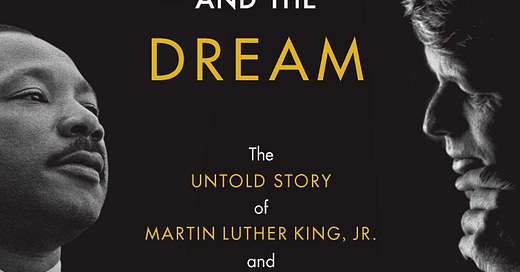On Martin Luther King Jr. Day 2021 we are reminded of the prevailing racial disparities that persist over a half-century since his death. The combined impact of the Covid-19 pandemic, racial justice protests, and toxic political climate should serve as a reminder to all Americans that major progress remains on the social, racial, health, and economic justice front.
Having just been born in June 1963 during the height of King’s ascension, I have no remembrance of him. Rather my focus was on playing GI Joe, listening to “Sly And The Family Stone,” and attending St. Mary’s of the Springs Montessori school.
So to recapture those times and the legacy of King, I have been reading a book entitled “The Promise And The Dream: The Untold Story of Martin Luther King, Jr, and Robert F. Kennedy” by David Margolick.
Replete with original interviews, oral histories, FBI files, and previously untapped materials, Margolick offers a deep dive into the lives of these two men, examining the unique and often terse bond that existed between them. He charts their life journey and respective assassinations which were just sixty-two days apart.
For both Robert Kennedy and his brother John the decorated U.S. president, Martin Luther King, Jr. was a constant thorn in their sides. The book adroitly captures the tone and rhetoric of the Kennedys toward King —- condescending and in the words of the author “slightly degrading.” King’s urgent requests for protection and policy action were often met by responses intended to placate him and the Civil Rights movement.
Then there was Edgar Hoover, head of the FBI, who held a personal disdain for Martin Luther King, Jr. With John F. Kennedy having been assassinated, Hoover often with Bobby Kennedy’s silent support intensified his efforts to discredit King by spying on him. King however displayed tremendous calm and diligence amid these attacks, holding Hoover and Kennedy in check amid the rapidly growing civil rights movement.
For many, Robert Kennedy’s rise in political prominence along with King being awarded the Nobel Peace Prize symbolized a hopeful future. Yet King, ever cognizant of his mortality, publicly expressed his certainty that he would be killed.
King and Kennedy forged separate but complementary paths toward freedom and liberty in the U.S. Even amid times of disagreement, they held quiet respect for one another.
In the end, The Promise delivers a compelling look at the crossing of their lives amid racial and socio-economic challenges that we sadly continue to face in America.





This is wonderful, Michael. Also, if you’re ever in the Atlanta airport, there’s display of MLK’s suit and personal effects. What I remember most is a pocket-sized book about Ghandi. King had underlined passages in pencil, and written notes to himself in the margins. It was one of the most powerful things I’ve ever seen. As revered as he was, he never stopped being a student of his craft.